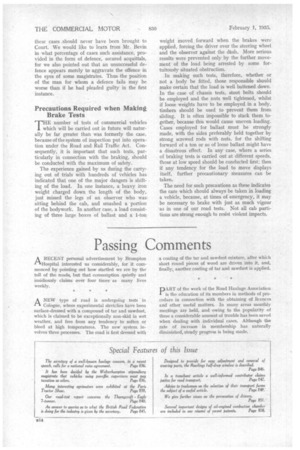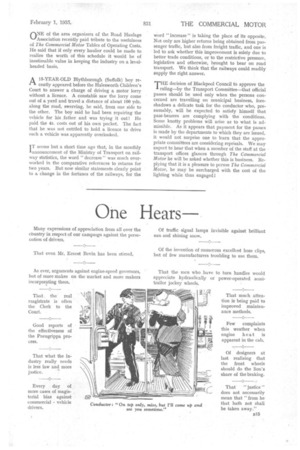Passing Comments
Page 24

Page 25

If you've noticed an error in this article please click here to report it so we can fix it.
A RECENT personal advertisement by Brompton f-kHospital interested us considerably, for it commenced by pointing out how startled we are by the toll of the roads, but that consumption quietly and insidiously claims over four times as many lives weekly.
A NEW type of road is undergoing tests in 1—I Cologne, where experimental stretches have been surface-dressed with a compound of tar and sawdust, which is claimed to be exceptionally non-skid in wet weather, and free from any tendency •to soften or bleed at high temperatures. The new system involves three processes. The road is first dressed with
a coating of the tar and sawdust mixture, after which short round pieces of wood are driven into it, and, finally, another coating of tar and sawdust is applied.
DART of the work of the Road Haulage Association I is the education of its members in methods of procedure in connection with the obtaining of licences and other useful matters. In many areas monthly meetings arp held, and owing to the popularity of these a considerable amount of trouble has been saved when dealing with individual cases. Although the rate of increase in membership has naturally diminished, steady progress is being made. ONE of the area organizers of the Road Haulage Association recently paid tribute to the usefulness of The Commercial Motor Tables of Operating Costs. He said that if only every haulier could be made to realize the worth of this schedule it would be of inestimable value in keeping the industry on a levelheaded basis.
A 15-YEAR-OLD Blythborough (Suffolk) boy re
cently appeared before the Halesworth Children's Court to answer a charge of driving a motor lorry without a licence. A constable saw the lorry come out of a yard and travel a distance of about 100 yds. along the road, swerving, he said, from one side to the other. The boy said he had been repairing the vehicle for his _father and was trying it out 1 He paid the 4s. costs out of his own pocket. The fact that he was not entitled to hold a licence to drive such a vehicle was apparently overlooked.
'IT seems but a short time ago that, in the monthly Iannouncement of the Ministry of Transport on railway statistics, the word "decrease" was much overworked in the comparative references to returns for two years. But now similar statements clearly point to a change in the fortunes of the railways, for the word " increase " is taking the place of its opposite. Not only are higher returns being obtained from passenger traffic, but also from freight traffic, and one is led to ask whether this improvement is solely due to better trade conditions, or to the restrictive pressure, legislative and otherwise, brought to bear on road transport. We think that the railways could readily supply the right answer.
rr'RE decision of Blackpool Council to approve the
I ruling—by the Transport Committee—that official passes should be used only when the persons concerned are travelling on municipal business, foreshadows a delicate task for the conductor who, presumably, will be expected to satisfy himself that pass-bearers are complying with the conditions. Some knotty problems will arise as to what is admissible. As it appears that payment for the passes is made by the departments to which they are issued, it would not surprise one to learn that the appropriate committees are considering reprisals. We may expect to hear that when a member of the staff at the transport offices glances through The Commercial Motor he will be asked whether this is business. Replying that it is a pleasure to peruse The Commercial Motor, he may be surcharged with the cost of the lighting while thus engagedl




















































































